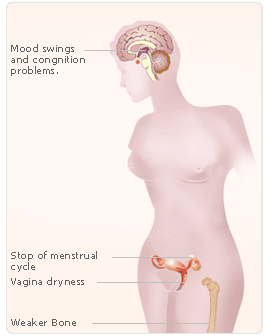Problems with attention? Concentration? Increased forgetfulness? If you are a midlife woman, you must be passing by through these difficulties. Research studies are showing that the natural estrogen declination process has adverse effects on mental functioning.

The average woman spends at least half of her adult life with decreased levels of estrogen.
Declining estrogen levels characterize menopause with effects on a range of systems including, in addition to the reproductive system, the cardiovascular and skeletal systems. You can see how estrogen declination affects the body in the chart at the right.
Results of studies examining the influence of estrogen on the cognitive function of postmenopausal women are far from consistent.
Dr. Shaywitz, M.D., from Yale University, points out, “Every woman who lives to the age of menopause will go through these changes in mental function.” Patients should not be intimidated about talking openly with their healthcare providers. Not all problems are due to sleep deprivation, depression, or aging alone.
Physicians should inquire about cognitive changes in women in their late 30's or early 40's whose estrogen levels are beginning to decline. Dr. Shaywitz says, “Verbal memory, fluency, and articulation are functions used in everyday life that may be sensitive to estrogen”.
Dr. Shaywitz and colleagues used functional magnetic resonance imaging to study the influence of estrogen on postmenopausal women's brain activation patterns during tasks involving verbal and nonverbal working memory. Forty-six postmenopausal women (aged 33 to 61 years) were treated with estrogen or placebo in a randomized, double-blind, placebo-controlled, crossover trial from 1996 through 1998.
The results showed that the treatment with estrogen increased activation in the inferior parietal lobule during storage of verbal material and decreased activation in the inferior parietal lobule during storage of nonverbal material. Estrogen also increased activation in the right superior frontal gyrus during retrieval tasks, accompanied by greater left-hemisphere activation during encoding. The latter pattern represents a sharpening of the hemisphere encoding/retrieval asymmetry (HERA) effect. Estrogen did not affect actual performance of the verbal and nonverbal memory tasks.
These findings show that it's possible to alter brain organization in older individuals,” Dr. Shaywitz said. “These alterations suggest plasticity in the memory systems of mature women and that these neural systems are neither fixed nor immutable.”
“While we believe the changes in brain organization should predict accompanying improvements in performance of memory tasks, we caution that in this study we did not observe such changes during the study period,” the researchers continue. “However, these data suggest that estrogen affects brain organization in postmenopausal women. In addition, functional imaging may provide a new tool to detect these effects of estrogen. The results are encouraging and suggest that the use of functional imaging together with protocols examining, for example, different dosages, treatment lengths and washout periods, may provide a new means to explore the effects of estrogen on cognitive function in postmenopausal women.”